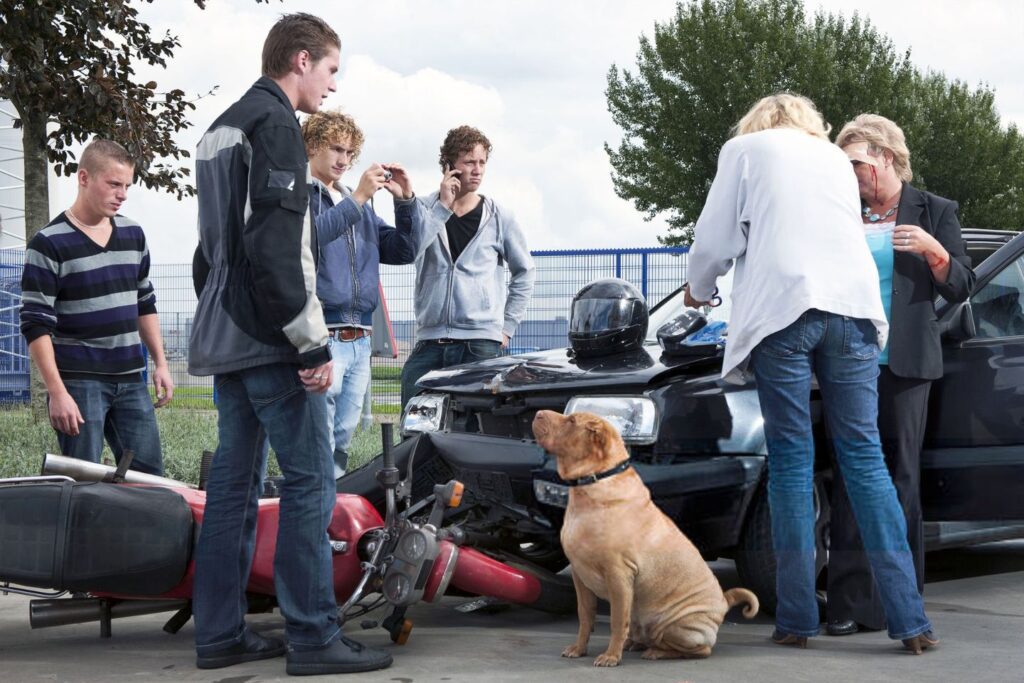Traffic accidents are an unfortunate reality in California, and for motorcyclists in Hayward, the risk is notably higher. Between 2018 and 2022, the city recorded an average of 47 motorcyclist fatalities and serious injuries each year. This statistic is a reminder of the risks every rider faces, underscoring the importance of preparedness and caution.
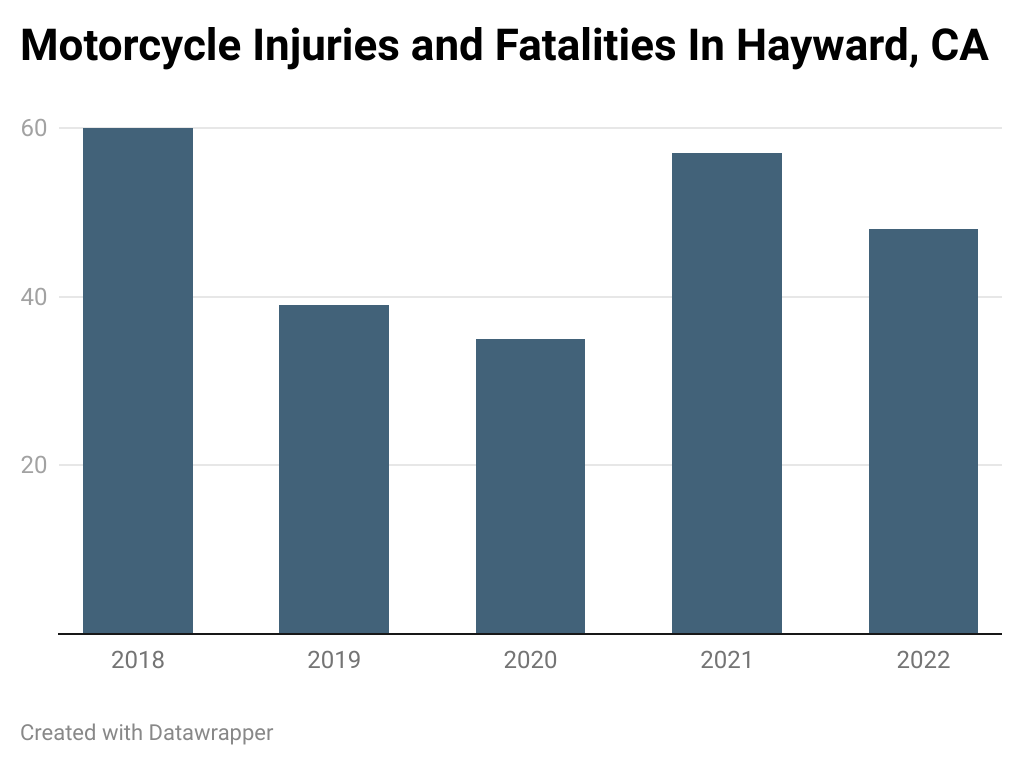

For those impacted by a motorcycle accident in Hayward, CA, finding solid ground can seem daunting. This guide is dedicated to unveiling the legal avenues open to accident victims, aiming to restore a sense of direction and control in the wake of such life-altering events.
The Causes and Impact of Motorcycle Accidents
Motorcycle riding offers an unmatched sense of adventure, but it’s not without its hazards, particularly in areas like Hayward, CA. Recognizing the common causes of accidents and their potential impacts is vital for every rider’s safety and preparedness.
Causes of Motorcycle Accidents in Hayward
Here’s a closer look at the factors that put riders at risk of accidents:
- Visibility Issues: The compact size of motorcycles makes them easily missed in traffic, particularly at intersections or during lane changes. In congested areas, the risk of being overlooked increases significantly.
- Road Hazards: Slippery surfaces, potholes, and debris pose significant risks to motorcyclists, particularly on older streets in downtown Hayward and near construction zones along the San Mateo-Hayward Bridge approach.
- Speeding: Exceeding speed limits not only reduces the time available to react but also increases the severity of injuries in accidents. Speed-related accidents are notably prevalent on the I-880 corridor passing through Hayward, where speeds often exceed safe limits.
- Lane Splitting: While legal in California, lane splitting requires skill and extreme caution, particularly during peak traffic hours on highways and city roads. Misjudgment during this maneuver can lead to collisions during rush hours.
- Impaired Driving: Driving under the influence of alcohol or drugs dramatically increases the likelihood of causing an accident. Nighttime and weekends see a rise in impaired driving incidents, with areas near bars and restaurants downtown being particularly high-risk zones.
Common Injuries from Motorcycle Accidents
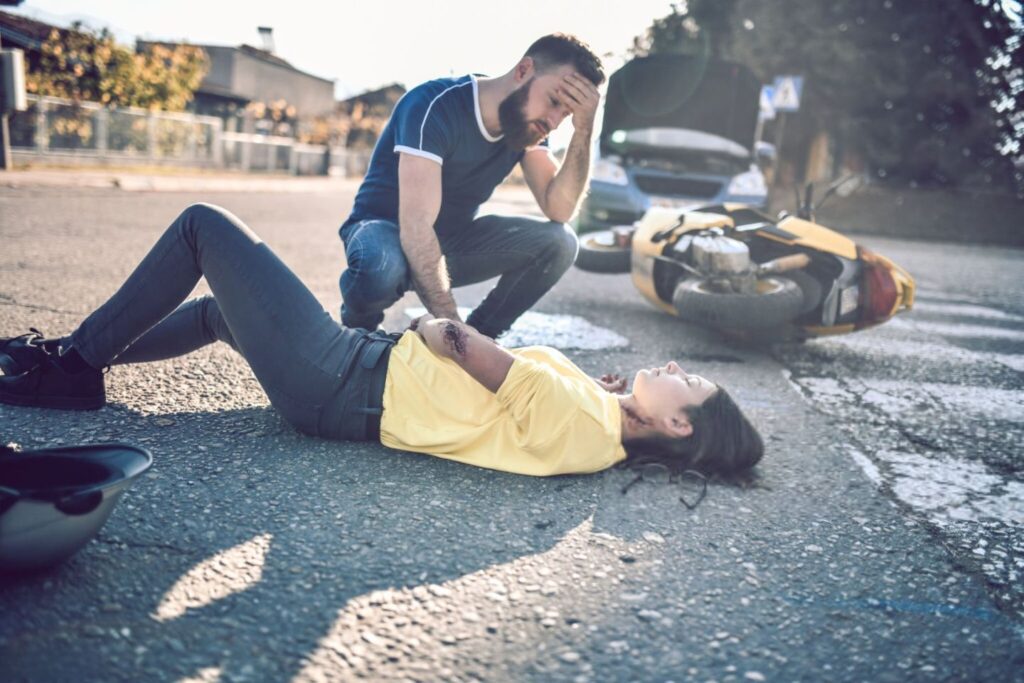

Here are some frequently occurring injuries from motorcycle crashes:
- Head Injuries: Helmets reduce the risk, but head injuries, including traumatic brain injuries, are still common.
- Road Rash: When riders are thrown from their motorcycles, sliding across pavement can cause severe abrasions.
- Broken Bones: The force of impact often results in fractures, particularly in the lower extremities.
- Spinal Cord Injuries: These injuries can have devastating consequences, including paralysis.
- Internal Injuries: The force of a collision can cause internal bleeding and damage to organs.
- Emotional Trauma: Accidents can also lead to significant emotional distress, including PTSD.
A motorcycle accident can bring about significant challenges, impacting your physical health, emotional well-being, and financial stability. Remember, you’re not alone in this. The Personal Injury Center is here to guide you, offering connections to expert legal assistance that’s specifically suited to your situation.
Who is Liable or at Fault in a Motorcycle Accident?
Determining liability or fault in a motorcycle accident in Hayward, CA, involves understanding specific state laws that govern road accidents.
California follows a “comparative fault” system, governed under California Civil Code 1714, which holds that a party can be held liable for damages proportional to their degree of fault in the accident. This means that in Hayward, as in the rest of California, more than one party can be found at fault, and the compensation each party receives will be adjusted based on their share of the blame.
Under the comparative fault rule, you can still recover damages even if you are partially responsible for the accident. However, your compensation will be reduced by your percentage of fault. For instance, if it’s determined that you are 20% at fault in a motorcycle crash, the damages you can recover will be decreased by 20%.
Determining Negligence in Motorcycle Accidents
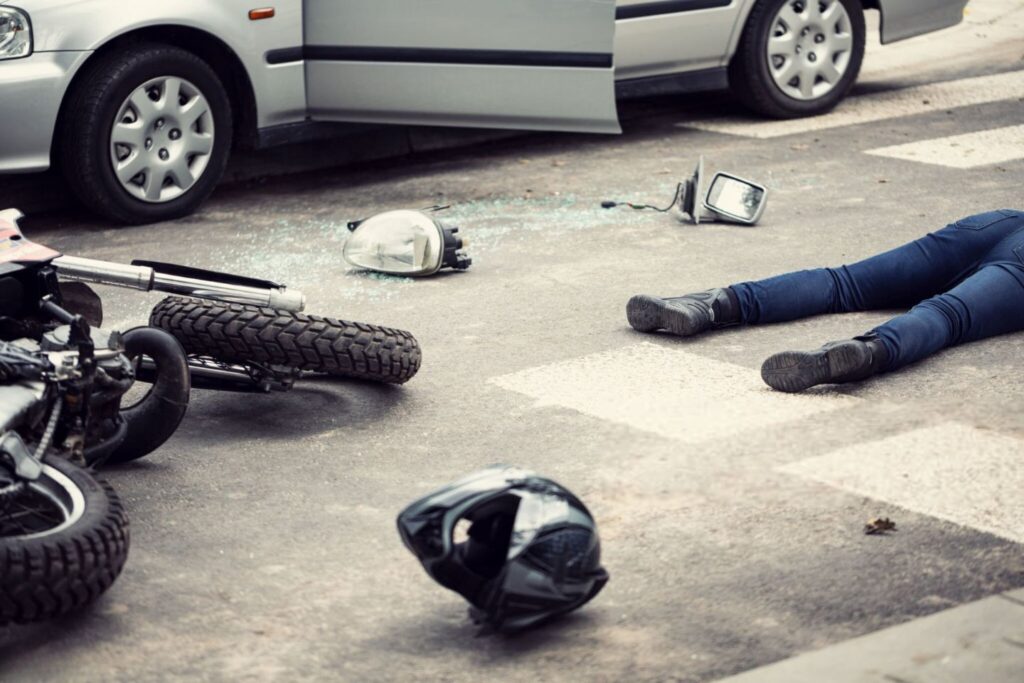

Fault in motorcycle accidents typically depends on negligence. A party is considered negligent when they fail to act with the level of care that a reasonably careful person would have used in the same situation.
In the context of motorcycle accidents in Hayward, negligence can manifest in various forms, including but not limited to:
- Violating Traffic Laws: When a driver or motorcyclist violates California traffic laws, they can be found negligent. For instance, speeding violations fall under California Vehicle Code 22350, which states that driving faster than is safe for current conditions is illegal and considered negligent behavior.
- Driving Under the Influence of Drugs or Alcohol: DUI is a serious offense in California, governed by Vehicle Code 23152, making it illegal to operate a vehicle under the influence of alcohol or drugs. A driver found DUI at the time of an accident is presumed negligent.
- Failing to Yield the Right of Way: The failure to yield the right of way, violating California Vehicle Code 21801(a), is a common cause of accidents. This law requires drivers turning left or entering a roadway to yield to oncoming traffic that is close enough to pose a hazard.
- Distracted Driving: Distracted driving, such as texting while driving, contravenes California Vehicle Code 23123.5. This code makes it illegal to use a handheld phone or to text while driving, with specific allowances for hands-free technology for adults over 18. Violating this law and causing an accident as a result is considered negligent behavior.
Evidence and Investigation
Proving negligence and determining fault in a motorcycle accident requires a thorough approach to collecting and investigating evidence. Here are essential types of evidence and tips for gathering them:
- Police Reports: Always file a report immediately after the accident, as this document provides an official account of the incident. Under California Vehicle Code Section 20008, you’re required to report any traffic accident that results in injury or death to the police or California Highway Patrol within 24 hours of the incident. This report can be a critical piece of evidence in establishing the facts surrounding the accident.
- Witness Statements: Collect contact information and statements from witnesses as soon as possible while their memories are fresh. Witness accounts can provide invaluable perspectives on the accident that may not be apparent from the physical evidence alone.
- Traffic Camera Footage: If the accident occurred in an area monitored by traffic cameras, such footage could offer clear insights into what happened. Requesting access to this footage promptly is crucial, as it is often retained for only a limited period.
- Expert Testimony: Specialists in accident reconstruction can examine the evidence at hand to piece together the events that led up to the crash. Their expertise can clarify issues of speed, trajectory, and impact, providing a scientific basis for establishing fault.
- Medical Records: Documenting your injuries and treatment is essential for substantiating your claims for compensation. Ensure that all medical consultations and treatments are thoroughly recorded and preserved.
Special Considerations for Motorcyclists
Motorcyclists must understand that biases may affect how fault is determined. There’s a common misconception that motorcyclists are inherently riskier or more reckless than other drivers. Overcoming this bias may require presenting clear, compelling evidence that the motorcyclist was following traffic laws and exercising due caution.
Legal Avenues for Motorcycle Accident Victims in Hayward, California
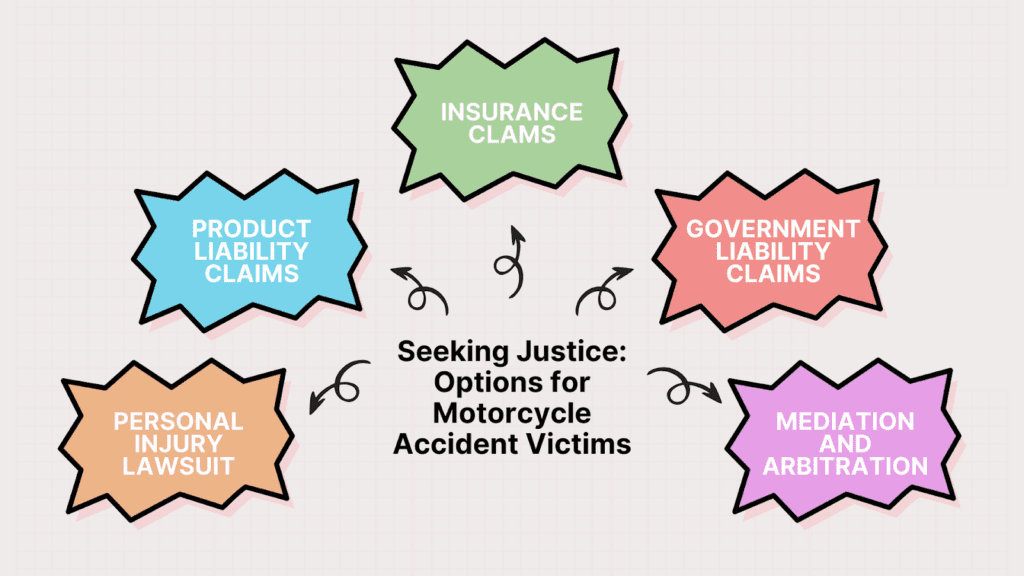

Motorcycle accident victims in Hayward, California, have several legal avenues to pursue compensation for their injuries and losses. Navigating these options effectively can make a significant difference in the outcome of your case.
Insurance Claims
Under California’s insurance regulations (California Insurance Code – INS § 11580.1b), motorcycle riders are required to carry minimum liability insurance, which includes:
- $15,000 for injury/death to one person
- $30,000 for injury/death to more than one person
- $5,000 for property damage.
Victims can file a claim with the at-fault party’s insurance company to cover damages. This is often the first step in seeking compensation, but it’s important to be wary of quick settlements that may not fully cover your losses.
Product Liability Claims
If your accident was caused by a defective motorcycle or part, you might have a product liability claim under California Civil Code 1714.45. This law holds manufacturers and distributors accountable for injuries caused by defective products, allowing victims to seek compensation for their injuries.
Government Liability Claims
If your motorcycle accident in Hayward, CA, was caused by hazardous road conditions or poor maintenance of public roads, you may have grounds for a government liability claim.
Under the California Tort Claims Act, injured parties can seek compensation from government entities responsible for maintaining safe roadways. However, strict deadlines and procedures apply, including a limited timeframe for filing claims, typically within six months of the accident. It’s crucial to gather evidence of negligence and consult with a knowledgeable personal injury attorney to navigate this process effectively.
Personal Injury Lawsuit
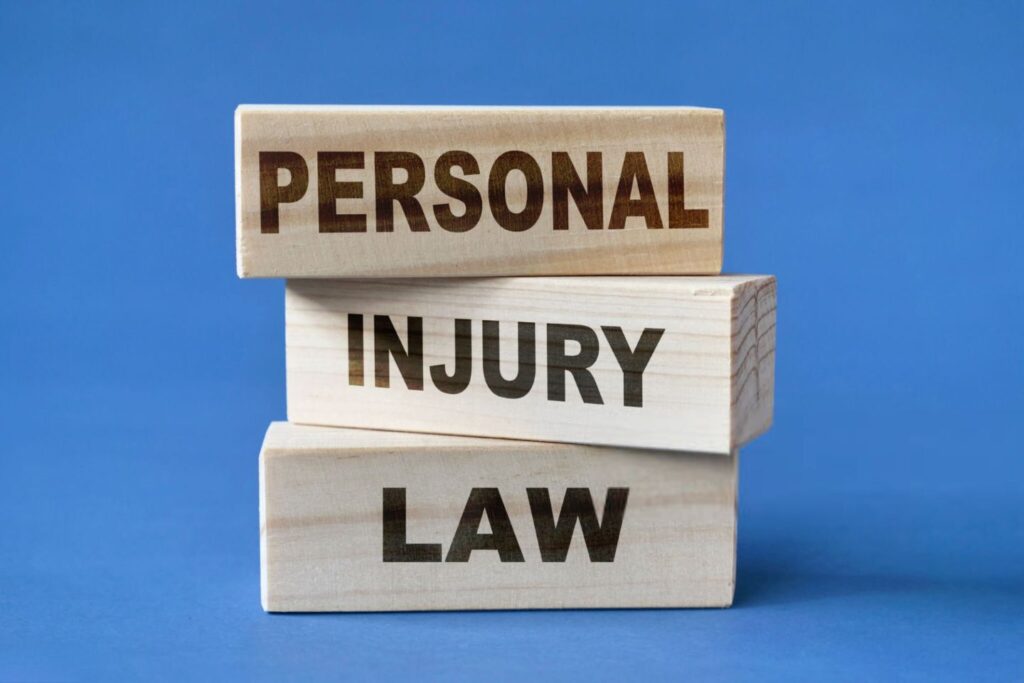

If insurance does not fully cover the damages, or if the at-fault party is uninsured, you may pursue a personal injury lawsuit under California Civil Procedure § 335.1, which allows two years from the date of the accident to file a claim. This legal action can seek compensation for medical expenses, lost wages, pain and suffering, and other damages.
Mediation and Arbitration
Mediation and arbitration offer alternative paths to settling disputes outside the courtroom, often leading to quicker and less costly resolutions.
- Mediation involves a neutral third party—the mediator—who works with both sides to reach a mutually agreeable settlement. It’s a collaborative process that empowers parties to control the outcome, making it a flexible option for resolving disputes arising from motorcycle accidents.
- Arbitration, on the other hand, is a bit more formal. An arbitrator (or a panel of arbitrators) listens to both parties present their cases and then makes a binding decision. This method is similar to a private trial, where the arbitrator’s decision is final and typically cannot be appealed. Both methods are confidential, which can benefit parties seeking privacy in their dispute resolution.
For personalized assistance tailored to your specific case, reach out to The Personal Injury Center for a free case evaluation. Our team specializes in connecting motorcycle accident victims with experienced legal professionals who can guide them through the process of establishing fault and pursuing fair compensation for their injuries and losses.
Key Takeaways
|
FAQs
Where do motorcycle accidents most often occur in Hayward?
High-traffic areas and busy intersections in Hayward, such as Mission Boulevard, Jackson Street, and near the Hayward BART station, are common sites for motorcycle accidents. The I-880 freeway also sees a higher incidence of collisions, particularly during peak hours.
Who is most often at fault in motorcycle-car crashes?
Fault varies by incident, but many motorcycle-car crashes happen because drivers overlook motorcycles. Common driver errors include failing to yield, unsafe lane changes, and distracted driving. Motorcyclists can also be at fault, especially when speeding or under the influence.
Can motorcycle gear affect an injury claim outcome?
Yes, wearing DOT-approved helmets and proper safety gear can positively impact an injury claim in California. Such gear not only reduces injury severity but also shows you were taking safety precautions, potentially influencing compensation amounts. However, not wearing appropriate gear might affect fault determination and compensation.



